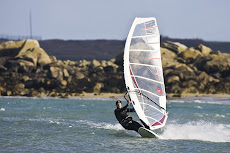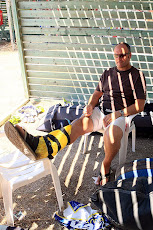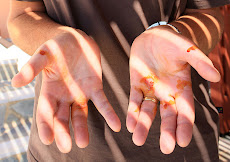Due to the winds switching off in Namibia we decided to leave early and travel through the Fish River Canyon on the way down to South Africa.
Friday, December 21, 2012
Monday, December 17, 2012
Luderitz Speed Challenge Report
From the 4th November until the 2nd of December a competition was held in Luderitz, Namibia to attempt to break the world speed sailing record.
I was able to book myself in for two weeks of the record attempt from the 19th November to the 2nd December.
This was the first time I have ever competed in an outright world record attempt. I have competed on the World and European Speed Tours for a long time but a record attempt is a whole different kettle of fish.
During Tour events you sail on open water along the shore line being timed over a 500m or 250m course. At the end of the course you gybe and sail back up the course outside the designated timed area. The best courses have the wind blowing offshore at 120 to 140 degrees to the shoreline, these conditions create the fastest times. Each day is sailed as a leg to the overall championships and can be sailed in all types of sea conditions and wind strengths.
The record attempt in Luderitz is sailed on a manmade canal approximately 1km long set at 150 degrees off the wind. You sail down the canal, get out at the end and get taken back to the start on a trailer. The first two weeks of the event had produced fantastic speeds with new World and National records. Watching all the action unfold was torture, I had been planning the trip for 9 months and couldn’t wait to get out there.
The great thing about record attempts is that you are only going to sail in the best conditions and hence you don’t need to travel with as much equipment as a tour event.
I was taking two speed boards, four sails, five masts, four booms and four fins, not a great deal, tour events would see me travel with double that amount. The plan was to pick up three more prototype sails and some fins already sent direct from the sail factory in China to Namibia.
Guernsey isn’t the easiest place to travel from and the Airport being closed for runway upgrades when we were supposed to be flying back didn’t help. Pierre Bisson from Gsyphoto.com travelled with me and without his help the trip would have proved impossible. The trip comprised of catching the overnight ferry to Portsmouth, drive up to Heathrow and fly out to Cape Town, hire a car and drive the 12 hours up through South Africa into Namibian and through the Namibian desert to Luderitz. WHAT TO GO WRONG!
Amazingly nothing did, everything went to plan even to the extent of not having to pay Excess baggage on the way out.
We arrived in Luderitz midday on the 19th November. The first view of the canal is daunting, 1km long but only 5-6m wide, any sort of problem or mistake whilst sailing down the canal at 50knots / 58mph and you’re going to hit a hard sand bank. That first day the wind wasn’t as strong as it had been the previous two weeks and the organisers had closed the canal to dredge it out more. The wind did increase during the day and I manage to sail down the course a few times once the excavator had finished.
20th November – The forecast for the day were for winds gusting up to 35knots not a great amount for record attempts but still enough to test out the canal properly. I sailed my Starboard W49, the bigger of the two boards I took, with a 6.0 sq m Hot Sails Maui GPS 2013 and recorded a maximum speed of 47.83 knots.
21st November – Again gusting up to 35 knots but a little more consistent. I used my smaller Starboard W44 with the Hot Sails Maui GPS 6.0m then the 5.5m and recorded a maximum speed of 50.20 knots. Getting quicker by the day and finding out more and more about my new sails and fins.
22nd November – The wind was slightly lighter. Small board and 6.0m recording a max of 49.55 knots. Lighter conditions but going almost as quick, we seemed on the right track.
25th November – Same winds as on the 22nd but the angle wasn’t as good. Maximum speed 48.55 knots.
With another week to go I was very confident that I had found the right settings for my sails and the right board fin combinations to challenge for the world record. Luderitz was picked for a record location due to consistently recording strong winds of 50knots or more, we hadn’t had them yet but the forecast everyday showed more wind to come later that second week unfortunately as the week progressed the forecast began to get worse and worse and in the end we didn’t have any more wind for the rest of the contest.
One more day was all I wanted.
Guernsey is great for windsurfing but it doesn’t get the conditions for really fast times. All the equipment I took to Namibia hadn’t been used before and it took time to adjust to work in those conditions. To the layman you put the mast in the sail tension the downhaul add a boom and away you go, it’s not quite that simple. 1cm more or less downhaul can change your speed by 2 or 3 knots, the same with the outhaul add to this changing size of fin for the conditions and there are a lot of variables that effect your speeds.
If we had winds in the second week like the first my times would have been faster however it isn’t all doom and gloom I have still managed to gain the WGPSSRC British speed record for your average speed over a 10 second period on the 21st November. The challenge now is develop new equipment to challenge for the world record which mean travelling to England and France to find flat water and strong winds for testing.
Regards
Martyn
THE WORK CARRIES ON
I was able to book myself in for two weeks of the record attempt from the 19th November to the 2nd December.
This was the first time I have ever competed in an outright world record attempt. I have competed on the World and European Speed Tours for a long time but a record attempt is a whole different kettle of fish.
During Tour events you sail on open water along the shore line being timed over a 500m or 250m course. At the end of the course you gybe and sail back up the course outside the designated timed area. The best courses have the wind blowing offshore at 120 to 140 degrees to the shoreline, these conditions create the fastest times. Each day is sailed as a leg to the overall championships and can be sailed in all types of sea conditions and wind strengths.
The record attempt in Luderitz is sailed on a manmade canal approximately 1km long set at 150 degrees off the wind. You sail down the canal, get out at the end and get taken back to the start on a trailer. The first two weeks of the event had produced fantastic speeds with new World and National records. Watching all the action unfold was torture, I had been planning the trip for 9 months and couldn’t wait to get out there.
The great thing about record attempts is that you are only going to sail in the best conditions and hence you don’t need to travel with as much equipment as a tour event.
I was taking two speed boards, four sails, five masts, four booms and four fins, not a great deal, tour events would see me travel with double that amount. The plan was to pick up three more prototype sails and some fins already sent direct from the sail factory in China to Namibia.
Guernsey isn’t the easiest place to travel from and the Airport being closed for runway upgrades when we were supposed to be flying back didn’t help. Pierre Bisson from Gsyphoto.com travelled with me and without his help the trip would have proved impossible. The trip comprised of catching the overnight ferry to Portsmouth, drive up to Heathrow and fly out to Cape Town, hire a car and drive the 12 hours up through South Africa into Namibian and through the Namibian desert to Luderitz. WHAT TO GO WRONG!
Amazingly nothing did, everything went to plan even to the extent of not having to pay Excess baggage on the way out.
We arrived in Luderitz midday on the 19th November. The first view of the canal is daunting, 1km long but only 5-6m wide, any sort of problem or mistake whilst sailing down the canal at 50knots / 58mph and you’re going to hit a hard sand bank. That first day the wind wasn’t as strong as it had been the previous two weeks and the organisers had closed the canal to dredge it out more. The wind did increase during the day and I manage to sail down the course a few times once the excavator had finished.
20th November – The forecast for the day were for winds gusting up to 35knots not a great amount for record attempts but still enough to test out the canal properly. I sailed my Starboard W49, the bigger of the two boards I took, with a 6.0 sq m Hot Sails Maui GPS 2013 and recorded a maximum speed of 47.83 knots.
21st November – Again gusting up to 35 knots but a little more consistent. I used my smaller Starboard W44 with the Hot Sails Maui GPS 6.0m then the 5.5m and recorded a maximum speed of 50.20 knots. Getting quicker by the day and finding out more and more about my new sails and fins.
22nd November – The wind was slightly lighter. Small board and 6.0m recording a max of 49.55 knots. Lighter conditions but going almost as quick, we seemed on the right track.
25th November – Same winds as on the 22nd but the angle wasn’t as good. Maximum speed 48.55 knots.
With another week to go I was very confident that I had found the right settings for my sails and the right board fin combinations to challenge for the world record. Luderitz was picked for a record location due to consistently recording strong winds of 50knots or more, we hadn’t had them yet but the forecast everyday showed more wind to come later that second week unfortunately as the week progressed the forecast began to get worse and worse and in the end we didn’t have any more wind for the rest of the contest.
One more day was all I wanted.
Guernsey is great for windsurfing but it doesn’t get the conditions for really fast times. All the equipment I took to Namibia hadn’t been used before and it took time to adjust to work in those conditions. To the layman you put the mast in the sail tension the downhaul add a boom and away you go, it’s not quite that simple. 1cm more or less downhaul can change your speed by 2 or 3 knots, the same with the outhaul add to this changing size of fin for the conditions and there are a lot of variables that effect your speeds.
If we had winds in the second week like the first my times would have been faster however it isn’t all doom and gloom I have still managed to gain the WGPSSRC British speed record for your average speed over a 10 second period on the 21st November. The challenge now is develop new equipment to challenge for the world record which mean travelling to England and France to find flat water and strong winds for testing.
Regards
Martyn
THE WORK CARRIES ON
Subscribe to:
Comments (Atom)




















